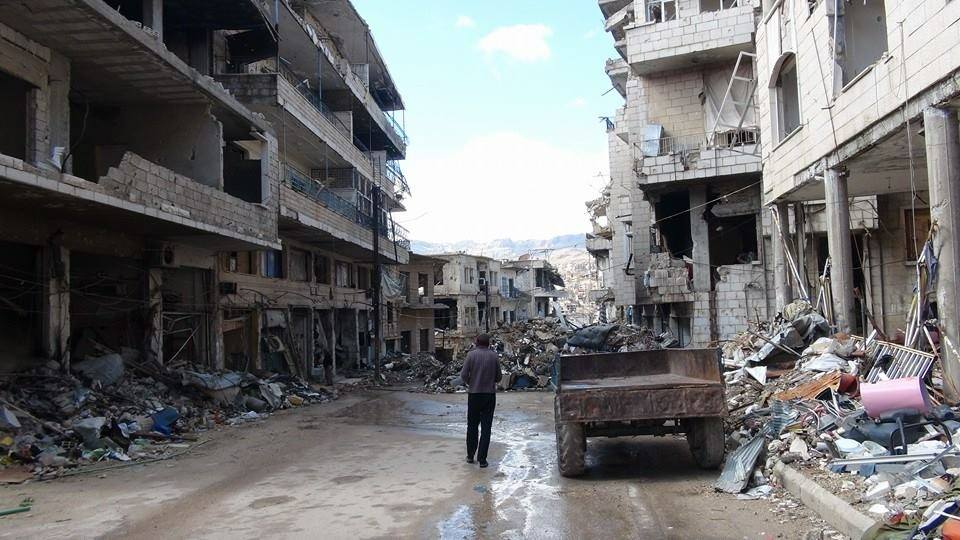Longing for Zabadani

I can still visualize it in all its cruelty and horror as if it were yesterday. The day I left Zabadani.
The memories still cause me pain and leave me sleepless.
It all started in January 2012. The government promised to launch an offensive against my city, to turn it into rubble and wipe out every living soul, if the demonstrations did not stop and the army defectors did not turn themselves in.
Zabadani is an enchanting city located in the Damascus western countryside, its landscape a combination of valley and mountain. Just 45 kilometres away from the capital, the city is famous for its fresh air, fruit and vegetables – especially its apples.
But the city had rebelled against the regime from the start. The first anti-government demonstration took place in March 25, 2011, and ever since then the city had not wavered.
Zabadani’s answer to the regime’s ultimatum was clear: the defectors would not be handed over.
Their response triggered the regime’s wrath.
In February 2012, the outskirts of Zabadani were struck by mortar shells. The assault was a warning to residents that danger was on its.
The residents thought it would be wise to leave their houses for a few days until the situation calmed down. Little did they know that this temporary departure would become permanent.
I can still recall the look on my father’s face, creased with wrinkles that come with old age and a lifetime of toil and hardship.
He lit up a cigarette and sat in deep thought, tears streaming down his tanned cheekbones.
He decided to leave to protect his children.
One afternoon in February, my mother packed a few things including bread, food and clothes. My father had secured a car owned by a member of the opposition. We threw our belongings and ourselves squeezed into it and left.
The journey did not take long. We drove as fast as possible to try to avoid the airstrikes, mortars and shrapnel. By some miracle, we survived.
When we reached our destination just outside of Zabadani, we were met by the familiar faces of many of our relatives and neighbours.
Their faces spoke of misery, pain and sorrow.
What particularly struck me was the face of an elderly man who had lost his house and his farmland. His face reflected the distress he felt due to his loss and displacement. I wonder now if he had realised that this was his first step towards exile.
During the day, the elderly people of our new neighbourhood would sit outside their flats. The women would click their rosary beads while muttering silent prayers.
The men would inquire about the fate of old neighbours and friends. One man told the story of his friend who had been killed along with his son during a mortar attack. Another talked about a friend who had fled to Damascus.
They also spent a lot of time wondering. What would become of their children, their houses, their farms and their apple trees?
As the days crept by, the air strikes crept closer to our location until they were finally upon us.
On April 24, 2012 the government launched an offensive on our neighbourhood. We ran for our lives, women, children and men alike.
We rushed to the ground floors of the buildings, huddling together in the hallways, reciting prayers from the Koran in the darkness.
We spent three hours of terror contemplating the unknown, wondering if we were about to die.
The upheaval finally calmed down, but then came the overpowering smell of death and destruction.
We slowly crept out of our hiding places to survey the area. It broke my heart to see the men and women gazing upon the remains of their homes. Even the apple, pear and fig trees hadn’t been spared.
Following the onslaught, we gathered our belongings and set out once again in search of the safety we had been craving since the day we left the warmth of our house.
We moved to the town of Bloudan, under government and popular committee control.

Six months after we had settled there, in Ramadan 2013, a group of men stormed our house while we were at the dinner table. They took my father and threatened to detain the rest of us for opposing the regime.
We do not know what has happened to my father. He is still missing, his fate unknown.
Once again, we packed our belongings, this time fleeing the country altogether.
We left on August 30, 2014, heading for Lebanon. We caught a glimpse of Zabadani en route. Tears streamed down our faces as we bid our houses, our alleys and our apple trees farewell.
We all said that we would come back, but we were all lying to ourselves.
We are now settled in Lebanon where we are treated as outcasts, and I still don’t feel safe.
Not a day goes by without me crying with longing for Zabadani, not a night goes by without my city calling out to me in my dreams.
I wonder, will I ever go back and see it again?
Nour Ahmad is the pseudonym of a Damascus Bureau contributor from Zabadani. The 26 year-old joined the uprisal against the government in mid 2012. She now lives in Lebanon where she works as a journalist and teaches Syrian children.
Read the Arabic version of this article here
